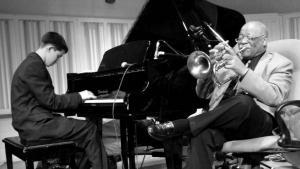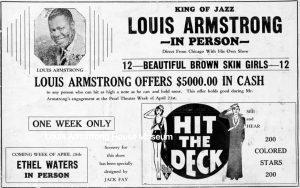Justin Kauflin
As a child, Justin Kauflin learned classical music on the violin and piano. By the age of 6, he was performing in concerts, nursing homes and weddings, eventually becoming concertmaster for several orchestras.
He graduated in the top 1% of his high school class and was Valedictorian of his class at the Governor’s School for the Arts. He received a Presidential scholarship to attend William Paterson University in New Jersey where he was mentored by the legendary trumpeter Clark Terry and was graduated summa cum laude. He began performing professionally at the age of 15 with the Jae Sinnett Trio and at 23, composed, performed and produced his first CD.
Pretty impressive resume for a 31-year-old who now travels the world as a Quincy Jones artist, performing solo, with his own trio/quartet, or as a sideman for various artists.
It’s even more impressive when you learn that Justin Kauflin battled deteriorating eyesight since he was seven months old, and by his 11th birthday had gone through 13 surgeries to treat complications from his condition. It was then that he lost total vision, and his world faded to black from exudative retinopathy, but his music proved to be his savior.
Overcoming Adversity
Justin led an active life growing up in Virginia Beach, Virginia in spite of his diminished eyesight. He insisted on going to a public school, and he loved to play basketball. Working with teacher aides who specialized in working with the blind, he excelled in school. His mother remembered, “The vision was taken away, but he was able to use his brain. I don’t know how he did it, but he was doing physics and calculus without a calculator.”
As a youngster, taking music lessons with his brothers and sister wasn’t his favorite thing to do. But when he lost his sight, he concentrated on music, saying, “I started falling in love with music the more I practiced. Going blind was a pivotal moment for me to realize how important music was. It brought the more important things into focus.”
He learned five grades of Braille and gained cane mobility. He moved to New York City, but soon realized that “visionless independent mobility” is painstakingly slow at best and life-threatening at worst. This led him to The Seeing Eye, Inc. in Morristown, New Jersey where he trained for a month with his now-constant companion, a black Labrador guide dog named Candy.
Featured in Documentary
It was while Justin was studying with mentor Clark Terry that a documentary about the life of the trumpet icon was being filmed. The original intent of the film was to focus exclusively on Terry’s life and work, but as the relationship between the jazz master whose vision had started to fail due to diabetes and the blind student deepened, and it was decided that Justin should play an integral role in Keep On Keepin’ On.

As the father of a son who had a severe lifelong disability, you quickly learn that there are things in life that you don’t or can’t always take for granted. The key is how you deal with the situation. When you catch Justin in performance, you need to realize that you are not just hearing a blind piano player who really swings. Clark Terry called it right when he wrote:
“Make sure you have enough time to absorb all the beautiful things in Justin’s talent—his timing, rhythm, technique and exactness. He’s a monster on the piano. And one of the greatest people I know.”
Talent and Optimism Prevail
As a critic for the Los Angeles Times wrote, “pianist Justin Kauflin is past the stage where his age is a factor in his virtuosity… his story is one of an exceptional talent and artistic maturity, but it’s also one of triumph and optimism.”
Justin, who is a Disability Awareness and Inclusion advocate along with all his other activities, sums it up, saying: “Would I be a musician now if I had not lost my sight? Probably not. And now I would not know what to do without it. Faith has been very important to me. A source of comfort and strength. I want my music to reflect that. I want it to be a prayer I can share with people.”
♫ ♫ ♫ ♫ ♫
Billed as a triple-threat talent, Katie Thiroux has garnered considerable attention of late for her swinging bass playing, assured singing and what is described as her “in-the-moment” compositions and arrangements. She took up the acoustic bass at age 8 and had private singing lessons with jazz vocalist Tierney Sutton at the age of 12. After graduating from the Berklee College of Music, she was asked to teach at the Berklee International School in Ecuador. Upon returning to her native Los Angeles, she completed a Master of Jazz Bass at California State University-Long Beach. Katie often incorporates workshops for students and audiences that draw on her belief that exposure to jazz history, culture, and styles is vital to keeping the music alive and thriving.
♫ ♫ ♫ ♫ ♫
Earl McKee, the Singing Cowboy with the High Sierra Jazz Band, is currently in a rehab facility in Visalia, California following successful knee surgery. The online fundraising campaign (www.gofundme/friends-of-big-earl) has passed the halfway mark to raise $20,000 to assist in covering medical bills and prescriptions not covered by Earl’s insurance. Some 86 people contributed in a little over three weeks. (For Syncopated Times readers not online, contributions may be sent to Earl McKee, 40719 Old Three Rivers Rd., Three Rivers, CA 93271-9563.)

♫ ♫ ♫ ♫ ♫
The Louis Armstrong House Museum displayed an advertisement on its website promoting Satchmo’s appearance at the Pearl Theatre in Philadelphia during Easter Week of 1930 in which the famed trumpeter offers $5,000 to anyone who could hit a high note as high and as long as he could. That ad dates from the start of the Great Depression, and $5,000 in 1930 dollars translates to $71,423.24 today.
♫ ♫ ♫ ♫ ♫
Jim Fitzgerald, retired majordomo of the Kinda/Sorta Dixie Jazz Band, took a spill in early April and broke his shoulder in two places. Hang tough, Big Guy.
♫ ♫ ♫ ♫ ♫
Cogent comment by trombonist-pianist Herb Gardner: “When I first got to New York, they knew I could play the tunes I knew. They wanted to know how I sounded on ones I didn’t know.”
♫ ♫ ♫ ♫ ♫
Allan Vache and Ken Peplowski will be soloists at a concert during the 2017 Clarinet Fest sponsored by the International Clarinet Association in Orlando, Florida July 26-30. The conference agenda will include five days of lectures, competitions, master classes, clarinet choirs, and solo and ensemble performances.
♫ ♫ ♫ ♫ ♫
One of the more intriguing names in the annals of jazz is Irving Milfred “Miff” Mole (1898-1961), considered one of the all-time great jazz trombonists who is credited with creating “the first distinctive and influential solo jazz trombone style.” His Okeh recording band, Miff Mole & His Little Molers (1927-30), backed Sophie Tucker and included Red Nichols, Arthur Schutt, Eddie Lang, and Jimmy Dorsey. Among the many groups with whom he played and recorded were the Paul Whiteman Orchestra, Red Nichols & His Five Pennies, Sam Lanin’s Ipana Troubadours, and Benny Goodman’s Orchestra. The headstone on his grave reads: “Miff.”
♫ ♫ ♫ ♫ ♫
Mike Greensill, who has a regular Wednesday night gig at Silo’s Nightclub in the Napa River Inn up in California’s wine country, is bringing wife Wesla Whitfield along for an expanded evening of great piano and vocals. As he explained, “The new gig is actually an adjunct to an existing gig. I will play my usual solo jazz piano stuff from 5 to 6 p.m. Then Wesla will do two sets from 6 to 8 p.m. after which, if you haven’t already succumbed to the sandman, I will finish out the evening from 8 to 9 p.m. with some more solo piano. Sound like a plan? And the very best part is…..NO COVER, NO MINIMUM.”
♫ ♫ ♫ ♫ ♫
A quote from an article in The Wall Street Journal: “Intelligent people lament that they don’t ‘understand’ classical music. Since when is understanding essential to loving?” (The same could be said about jazz!)
Lew Shaw started writing about music as the publicist for the famous Berkshire Music Barn in the 1960s. He joined the West Coast Rag in 1989 and has been a guiding light to this paper through the two name changes since then as we grew to become The Syncopated Times. 47 of his profiles of today's top musicians are collected in Jazz Beat: Notes on Classic Jazz.Volume two, Jazz Beat Encore: More Notes on Classic Jazz contains 43 more! Lew taps his extensive network of connections and friends throughout the traditional jazz world to bring us his Jazz Jottings column every month.






















